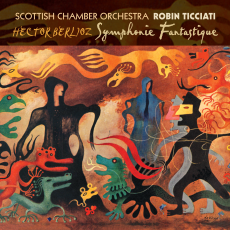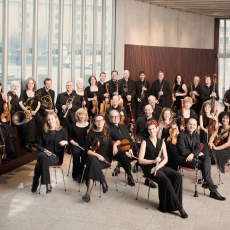Berlioz Symphonie Fantastique - SCO & Ticciati - Musicweb International
The Symphonie fantastique offers a special challenge - it's easy to make it sound good and I don't know any bad recordings, but it's exceptionally difficult to make it sound great. In the April 2012/1 Roundup Colin Davis's Concertgebouw recording was Download of the Month, partly for the sake of the performance and partly for the quality of Linn's Studio Master 24/96 transcription of the Decca (formerly Philips) recording. That Davis recording is one of only a handful that I can think of that does the trick for me. Could Linn pull off the double with their new recording?
Right from the opening the recorded quality is excellent - as soft as you could wish yet not so quiet that you need to turn up the volume to a level where the loud passages knock you out. Later, at the other end of the aural scale, the full snarling menace of the March to the Scaffold is extremely well captured, especially the ‘grotesque bassoons' to which the excellent sleeve notes refer.
The performance gets off to a slow start, but I think that's partly the fault of Berlioz - it's all too easy for newcomers to be put off
exploring the music further for that perennial disgruntled teenage reason: ‘boring'. If only I'd had £5 for every time as a deputy head of a large school I'd heard that word uttered as the reason why someone had been sent to me for disrupting a lesson! Even Beecham sounds a little tentative, though his is one of the versions that join Davis at the top of the pile. When Berlioz gets underway, so does Robin Ticciati and the same is true in the second movement.
The third movement, scène aux champs, provides an interlude of peace between the whirling ball and the horrendous march to the
scaffold, with Beethoven's Pastoral Symphony no doubt in Berlioz's unconscious. I thought it a little too placid in the new recording, to the extent that I thought that this must be one of the slowest accounts of the movement - only to be surprised to discover that, of my short-listed recordings, only Immerseel is slightly faster: Beecham takes longer (16:57 against 16:17) and Dutoit longer still (17:15).
In the march to the scaffold Ticciati neither lingers nor hastens - at 6:35 he's not one of the fastest marchers - Beecham takes just 5:18 and makes it sound energetic and menacing but not too hurried. He's not the slowest either, with van Immerseel a whole minute slower. The extreme range of tempi shouldn't make sense - Dutoit's Philharmonia recording, faster even than Beecham at 4:37, extends that range even further - yet somehow all three manage to convey the snarling menace of the music here; in the case of Immerseel and the new recording the use of smaller forces helps, the drum strokes coming through more clearly for example, with Immerseel also having the benefit of period instruments.
Standing on the middle ground isn't always a virtue, but it is for Ticciati here, especially when Colin Davis with both the LSO and the Concertgebouw adopted a very similar timing. Ticciati is a trifle slower than Davis with the Concertgebouw in the witches' sabbath finale but there's no shortage of voltage in the new performance, and the recording brings that out to the full - the end really does sound cataclysmic. Davis's latest recording with the LSO on their in-house label is marginally slower than Ticciati. In both recordings the bells sound more effective that Immerseel's pianos, though the latter arrangement apparently had Berlioz's support, if only for occasions when suitable bells were not available.
The Overture sounds an irrelevance after that: it registers as merely pleasant - try to programme it to play first - but it receives a good performance.
I didn't think the Scottish Chamber Orchestra could pull it off now that Charles Mackerras is no longer with us and them, but I think their new recording would have earned his approval. Not quite a double first for Linn, then, but a very good 2:1.


